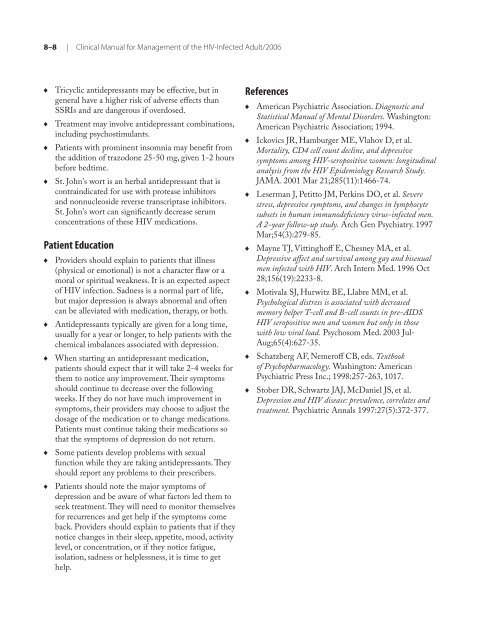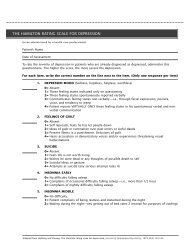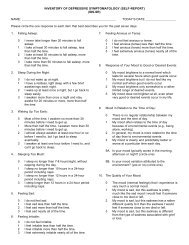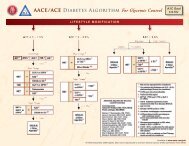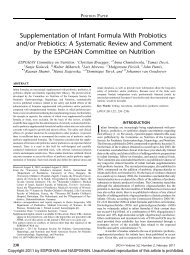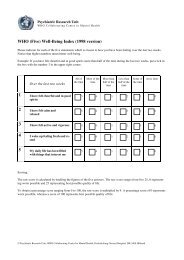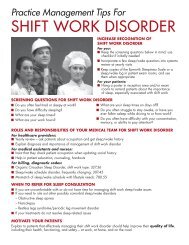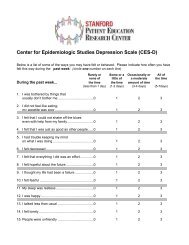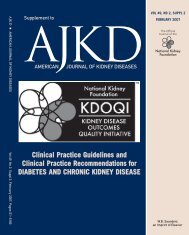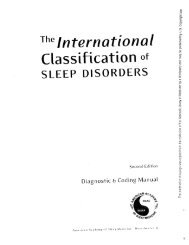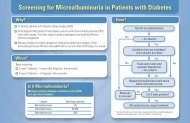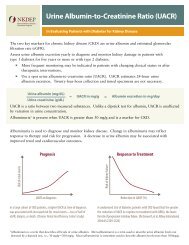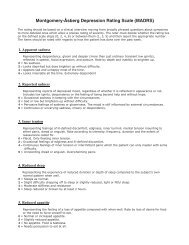Clinical Manual for Management of the HIV-Infected ... - myCME.com
Clinical Manual for Management of the HIV-Infected ... - myCME.com
Clinical Manual for Management of the HIV-Infected ... - myCME.com
Create successful ePaper yourself
Turn your PDF publications into a flip-book with our unique Google optimized e-Paper software.
8–8 | <strong>Clinical</strong> <strong>Manual</strong> <strong>for</strong> <strong>Management</strong> <strong>of</strong> <strong>the</strong> <strong>HIV</strong>-<strong>Infected</strong> Adult/2006<br />
♦<br />
♦<br />
♦<br />
♦<br />
Tricyclic antidepressants may be effective, but in<br />
general have a higher risk <strong>of</strong> adverse effects than<br />
SSRIs and are dangerous if overdosed.<br />
Treatment may involve antidepressant <strong>com</strong>binations,<br />
including psychostimulants.<br />
Patients with prominent insomnia may benefit from<br />
<strong>the</strong> addition <strong>of</strong> trazodone 25-50 mg, given 1-2 hours<br />
be<strong>for</strong>e bedtime.<br />
St. John's wort is an herbal antidepressant that is<br />
contraindicated <strong>for</strong> use with protease inhibitors<br />
and nonnucleoside reverse transcriptase inhibitors.<br />
St. John's wort can significantly decrease serum<br />
concentrations <strong>of</strong> <strong>the</strong>se <strong>HIV</strong> medications.<br />
Patient Education<br />
♦<br />
♦<br />
♦<br />
♦<br />
♦<br />
Providers should explain to patients that illness<br />
(physical or emotional) is not a character flaw or a<br />
moral or spiritual weakness. It is an expected aspect<br />
<strong>of</strong> <strong>HIV</strong> infection. Sadness is a normal part <strong>of</strong> life,<br />
but major depression is always abnormal and <strong>of</strong>ten<br />
can be alleviated with medication, <strong>the</strong>rapy, or both.<br />
Antidepressants typically are given <strong>for</strong> a long time,<br />
usually <strong>for</strong> a year or longer, to help patients with <strong>the</strong><br />
chemical imbalances associated with depression.<br />
When starting an antidepressant medication,<br />
patients should expect that it will take 2-4 weeks <strong>for</strong><br />
<strong>the</strong>m to notice any improvement. Their symptoms<br />
should continue to decrease over <strong>the</strong> following<br />
weeks. If <strong>the</strong>y do not have much improvement in<br />
symptoms, <strong>the</strong>ir providers may choose to adjust <strong>the</strong><br />
dosage <strong>of</strong> <strong>the</strong> medication or to change medications.<br />
Patients must continue taking <strong>the</strong>ir medications so<br />
that <strong>the</strong> symptoms <strong>of</strong> depression do not return.<br />
Some patients develop problems with sexual<br />
function while <strong>the</strong>y are taking antidepressants. They<br />
should report any problems to <strong>the</strong>ir prescribers.<br />
Patients should note <strong>the</strong> major symptoms <strong>of</strong><br />
depression and be aware <strong>of</strong> what factors led <strong>the</strong>m to<br />
seek treatment. They will need to monitor <strong>the</strong>mselves<br />
<strong>for</strong> recurrences and get help if <strong>the</strong> symptoms <strong>com</strong>e<br />
back. Providers should explain to patients that if <strong>the</strong>y<br />
notice changes in <strong>the</strong>ir sleep, appetite, mood, activity<br />
level, or concentration, or if <strong>the</strong>y notice fatigue,<br />
isolation, sadness or helplessness, it is time to get<br />
help.<br />
References<br />
♦<br />
♦<br />
♦<br />
♦<br />
♦<br />
♦<br />
♦<br />
American Psychiatric Association. Diagnostic and<br />
Statistical <strong>Manual</strong> <strong>of</strong> Mental Disorders. Washington:<br />
American Psychiatric Association; 1994.<br />
Ickovics JR, Hamburger ME, Vlahov D, et al.<br />
Mortality, CD4 cell count decline, and depressive<br />
symptoms among <strong>HIV</strong>-seropositive women: longitudinal<br />
analysis from <strong>the</strong> <strong>HIV</strong> Epidemiology Research Study.<br />
JAMA. 2001 Mar 21;285(11):1466-74.<br />
Leserman J, Petitto JM, Perkins DO, et al. Severe<br />
stress, depressive symptoms, and changes in lymphocyte<br />
subsets in human immunodeficiency virus-infected men.<br />
A 2-year follow-up study. Arch Gen Psychiatry. 1997<br />
Mar;54(3):279-85.<br />
Mayne TJ, Vittingh<strong>of</strong>f E, Chesney MA, et al.<br />
Depressive affect and survival among gay and bisexual<br />
men infected with <strong>HIV</strong>. Arch Intern Med. 1996 Oct<br />
28;156(19):2233-8.<br />
Motivala SJ, Hurwitz BE, Llabre MM, et al.<br />
Psychological distress is associated with decreased<br />
memory helper T-cell and B-cell counts in pre-AIDS<br />
<strong>HIV</strong> seropositive men and women but only in those<br />
with low viral load. Psychosom Med. 2003 Jul-<br />
Aug;65(4):627-35.<br />
Schatzberg AF, Nemer<strong>of</strong>f CB, eds. Textbook<br />
<strong>of</strong> Psychopharmacology. Washington: American<br />
Psychiatric Press Inc.; 1998:257-263, 1017.<br />
Stober DR, Schwartz JAJ, McDaniel JS, et al.<br />
Depression and <strong>HIV</strong> disease: prevalence, correlates and<br />
treatment. Psychiatric Annals 1997:27(5):372-377.


